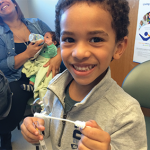- Preparation, when they can help set agendas and goals;
- Execution, when they can consult on the study’s design and procedures and help with recruitment; and
- Translation, when they help investigators evaluate, disseminate and implement findings.
What are the best methods for engaging patients and parents in research? Although no studies have measured the effectiveness of different outreach techniques, best practices include reciprocal, transparent relationships among patients, parents and investigators. “Start out trying to build a relationship rather than saying, ‘We need a patient on our grant to be able to apply to PCORI.’ No, [the goal is] to improve the study and have a better impact,” Dr. Morgan said. “Make sure the patients and parents [who] are engaged are full members of the study team.”
Patients and parents can help deliver and disseminate study findings as well. “When patients are delivering your results, it’s very impactful,” she said.
Patients and parents engaged in study development should be compensated for their time—payments distinct from those made to human study subjects, which are governed by institute review boards, Dr. Morgan said.4
PCORI offers a free online resource to help researchers engage patients. Called Family and Youth Research Education: Trainings and Resources for Research Partnerships Involving Adolescents (FYREworks), it includes web-based training for researchers and patients, as well as recruitment toolkits.
Susan Bernstein is a freelance journalist based in Atlanta.
References
- Smith B, Benjamin D, Bradley J, et al. Investigator barriers to pediatric clinical trial enrollment: Findings and recommendations from the clinical trials transformation initiative. Pediatrics. 2018 May 1;142(1 Meeting Abstract):796.
- Ringold S, Tomlinson G, Weiss P, et al. The Childhood Arthritis and Rheumatology Research Alliance start time optimization of biologic therapy in polyarticular JIA study: Patient characteristics, patient reported outcomes and consensus treatment plan choices. Arthritis Rheumatol. 2019;71(suppl 10). [abstract 2703]
- Domecq JP, Prutsky G, Elraiyah T, et al. Patient engagement in research: A systematic review. BMC Health Serv Res. 2014 Feb 26;14:89.
- Patient-Centered Outcomes Research Institute. Policy statement: Financial compensation of patients, caregivers, and patient/caregiver organizations engaged in PCORI-funded research as engaged research partners. 2015 Jun 10.


